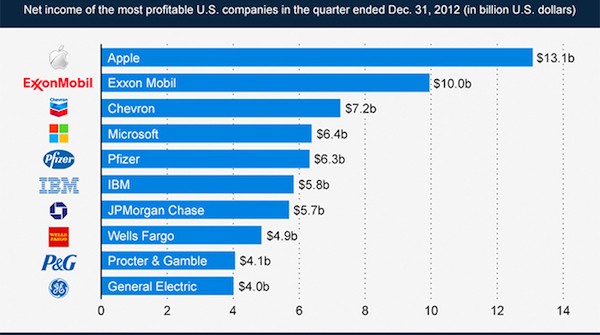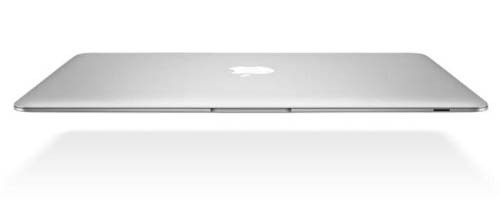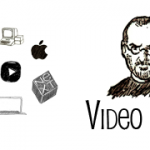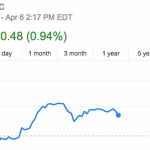
Let me take you back for a moment to 1997.
Stock in Apple Inc. was trading at a ten-year low ($13 per share). The Macintosh was outdated, the Newton had flopped, and Apple’s board of directors had just ousted their second CEO in as many years.
It looked like Apple would be obsolete by the millennium.
But you know the rest of the story: Steve Jobs took the reins in 1998, unveiled the iMac, and proceeded to guide Apple through an unprecedented period of growth and profitability.
Last week, stock in Apple Inc. surpassed $500 per share for the first time – which makes it the world’s most valuable company. Below, I’ll explain four ways Apple climbed to the top of Wall Street and how you can apply the same strategies with your business.
Apple Targeted Emerging Markets
Apple has been developing products for emerging markets since they first started in 1976. Of course, back then the personal computer was still in an emerging market.
A lot has changed in the last 35 years, but Apple continues to focus its efforts on markets that are new – and therefore less competitive. Their products aren’t usually the first of their kind, but they are almost always the first to get it right.
Take the iPod. It wasn’t the first portable mp3 player, but it was the first to be intuitively designed and well-marketed.
The same could be said of the iPhone for the smart phone market and the iPad for the tablet market. Apple has come to dominate these niches that are now well-developed and very lucrative.
Pioneering New Frontiers
You don’t have $10 million to spend developing innovative technologies, so how are you going to stand a chance in an emerging market?
It’s not as hard as it sounds.
In the world of online entrepreneurship, there’s a new market emerging every week. Mobile marketing, online video production, and social media services are all growing fields that aren’t going anywhere any time soon.
Apple Cultivated Recurring Revenue
True wealth doesn’t come from launching one big product or making one big deal. It comes from tapping into streams of revenue that keep producing profits month after month. Nobody is better at this than Apple.
It started in 2001 with iTunes, a free music player with a built-in store. Ever since, Apple has been raking in hundreds of millions of dollars a year from iTunes sales of music, movies, and books.
In 2008, Apple introduced the App Store. It has been even more lucrative than iTunes, since Apple gets 30% of every app sale.
Then there’s the mobile market. Verizon and AT&T love Apple because their iPhones are great at inspiring customers to pay extra every month for a data plan.

With all of these different sources of recurring revenue, Apple wouldn’t have to launch another product and they would still be making money for years to come.
How You Can Earn Recurring Revenue
Recurring revenue isn’t just for tech industry giants.
The best example of recurring revenue online is membership sites. The concept is simple: in order to gain access to an online resource (videos, guides, and forums), users must agree to pay a recurring fee.
Another way to make a monthly income is by attracting companies to put advertisements on your website. If you take good care of your advertisers, they’ll keep paying you for space on your site for as long as you want.
If you’re like me and you offer an online service, consider offering your clients a monthly maintenance program – or just a longer contract with more deliverables.
Apple Embraced Luxury Culture

Why is it that Apple has never offered a budget laptop?
Companies like Dell and Gateway have long been “racing to the bottom,” trying to provide the best value at the lowest price.
But Apple has stayed above the fray. The cheapest Macbook ($999) is almost three times as expensive as the cheapest laptop HP has to offer.
If Apple offered a budget-priced Macbook, I’m sure it would fly off the shelves. They would make (another) boatload of cash. But they won’t be doing that any time soon.
The reason is simple: they like that their products are considered luxury purchases.
Owning an Apple product has become a social signifier. Pulling out your iAnything indicates that you’re doing well enough financially to splurge on a higher-priced gadget.
Don’t Race to the Bottom
People tend to ascribe more value to items with higher prices. So think twice about trying to have the lowest price in town.
If you’re offering a product or service, consider having one luxury option. It will make your standard prices seem low in comparison.
Better yet, you’ll likely get a few customers who actually want to shell out more money to get something luxurious.
Apple Built a Brand
We’ve all witnessed Apple-mania first hand.
The phenomenon is widespread: Fortune magazine has named Apple the world’s most admired company for the last four years (2008 to 2011).
It all comes down to their brand – which Apple has artfully developed since their inception.
Their former tagline, “Think Different,” didn’t just sell computers; it sold a counter-culture.
Apple has also built their brand through consistent design. From the iMac on, every major Apple product has had the same leading designer, Jonathon Ive. That means that there has been a unified vision behind the design of the iPod, Macbook, iPhone, iPad, and more.
Of course, a brand is so much more than a name, marketing campaign, or aesthetic. The real substance of Apple’s brand comes from the perception that their products are intuitive, reliable, and powerful.
What’s in a name?
It’s no secret that Apple has fostered their brand by using similar product names: iPod, iMac, iThis, iThat. All Apple has to do is put a lowercase ‘i’ in front of a one syllable word and they’re set.
You can use a similar tactic to create your own brand identity. If you’re choosing a name for your company or for your next product, think about using a distinctive word that will be versatile. That way, you will be able to use variations of it in future.
Will Apple Stay on Top of the World?
According to the laws of physics, what comes up must come down.
Some doubt that Apple will continue to innovate without the guidance of Steve Jobs. Others think they will lose ground in the less affluent global markets that are increasingly purchasing consumer electronics. And lately Apple has come under fire again for its labor practices.
Apple will be facing its fair share of challenges in 2012 and beyond. But the underlying principles at the core of the company make me believe Apple will still be the world’s most valuable company this time next year.
















